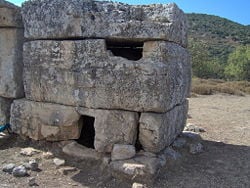Shammai
Shammai (50 B.C.E.–30 C.E.) was a famous Jewish scholar of the 1st century, and an important figure in Judaism's core work of rabbinic literature, the Mishnah. He was the most eminent contemporary and opponent of Hillel, taking a strict position on the interpretation of Jewish law versus Hillel's more liberal interpretation on many matters. Both teachers were part of the movement known as the Pharisees, who sought to increase piety among the Jewish people by emphasizing the application of the Law of Moses in everyday life, rather than insisting mainly on the tradition of the Temple of Jerusalem.
Shammai's school of thought became known as the House of Shammai (Beit Shammai), and Hillel's was known as the House of Hillel (Beit Hillel). The debates between these two schools of Jewish thought form the basis for many of the latter discussions recorded in the Talmud. They also impact on the history of early Christianity, in which Jesus appears to side with the school of Hillel on most matters, sometimes bitterly denouncing the strict legalism of what appear to be the followers of Shammai.
Background and character
Shammai was likely a Palestinian Jew. His family was relatively well off, and he was an engineer by trade. Of an irascible temperament, he seemed to lack some of the tireless patience which is said to have distinguished Hillel. A famous story characterizing him tells of a time when a gentile came to him and asked to be converted to Judaism upon the condition that he summarize the entire Torah while standing on one leg. Shammai held this to be both impossible and impertient, and he drove the applicant away with his measuring stick. Hillel, on the other hand succeeded in converting doing as the seeker requested by summarizing all of "the Law and the Prophets" with the famous dictum: "What is hateful to you, do not unto your neighbor." (Shabbat, 31a).
Nevertheless Shammai was in no way a misanthrope. He appears to have realized the disadvantages of his temper. Thus he recommended a friendly attitude toward all. His motto was: "Make the study of the Torah your chief occupation; speak little, but accomplish much; and receive every man with a friendly countenance" (Avoth, i. 15). He was modest even toward his pupils.
Yet, in his religious views Shammai was known to be strict. When he wished to make his son, while still a young child, conform to the law regarding fasting on Yom Kippur (the Day of Atonement), he was dissuaded from his purpose only through the insistence of his friends (Yoma, 77b). On another occasion, when his daughter-in-law gave birth to a boy on Sukkot (the Feast of Tabernacles) he broke through the roof of the bedchamer in order to make a sukkah of it, so that his new-born grandchild might fulfil the religious obligation of the festival (Sukkah, 28a).
=Leaderhip in Jerusalem
In Shammai's day, the governing council of the Jews, or Sanhedrin was controlled by the Pharisees, to which both he and Hillel belonged. Hillel served as the council's president. After Menahem the Essene resigned the office of vice-president, Shammai was elected to it. Then, after Hillel died, around in 20 C.E., Shammai took his place as president with no vice-president from the minority being elected. The school of Shammai thus attained complete ascendancy, during which Shammai passed his "18 ordinances" in conformity with his ideas.
The exact content of Shammai's ordinances is not known, but they seem to have been designed to strengthen Jewish identity by insisting on stringent separation between Jews and gentiles, an approach that was regarded as divisive and misanthropic by the followers of Hillel.
The liberal Pharisees were thus forced into not only a minority position, but a relatively powerless one. Hillel's grandson Gamaliel succeeded the position of president after Shammai in the year 30, but the Sanhedrin would remain basically dominated by the house of Shammai until around 70 (see Council of Jamnia). A "voice from heaven" is said to have nullified the legality of the rulings of the house of Shammai (Berakhot, 1:7), which is why Rabbinical Judaism follows Hillel.
An opinion preserved in theTalmud goes so far as to state that when Shammi passed one of the ordinances—a law completely contrary to the opinion of Hillel—the day "was as grievous to Israel as the day when the golden calf was made" (Shabbat, 17a).
Teachings
=Shammai and Christianity
ReferencesISBN links support NWE through referral fees
External links
This article incorporates text from the 1901–1906 Jewish Encyclopedia, a publication now in the public domain.
Credits
New World Encyclopedia writers and editors rewrote and completed the Wikipedia article in accordance with New World Encyclopedia standards. This article abides by terms of the Creative Commons CC-by-sa 3.0 License (CC-by-sa), which may be used and disseminated with proper attribution. Credit is due under the terms of this license that can reference both the New World Encyclopedia contributors and the selfless volunteer contributors of the Wikimedia Foundation. To cite this article click here for a list of acceptable citing formats.The history of earlier contributions by wikipedians is accessible to researchers here:
The history of this article since it was imported to New World Encyclopedia:
Note: Some restrictions may apply to use of individual images which are separately licensed.
